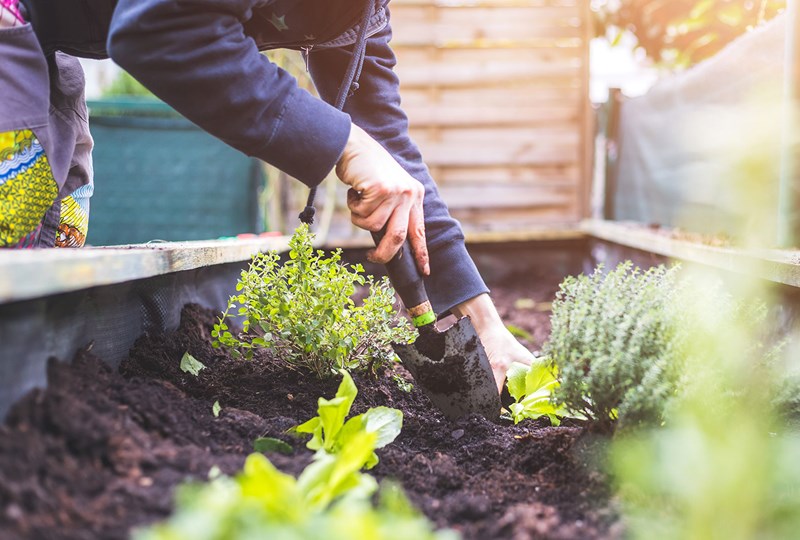
Key insights:
- Planning, prepping and planting are the essential steps for a successful at-home veggie garden.
- Use your household’s compost to fuel your vegetable garden.
- Be sure to maintain the quality of your garden while keeping an eye out for pesky weeds.
While Minnesota and Wisconsin are notorious for their extreme winter weather, the opportunity to plant a garden in the spring or summer remains possible (and popular!). Many homeowners focus on their property’s landscaping and flower gardens — which undoubtedly add a beautiful touch to any staged home — but fruit and vegetable gardens are equally as valuable.
As summer approaches, consider cultivating your own garden filled with fruits and veggies. Creating an at-home garden opens the door to a rewarding pastime, and it’s a sustainable option as well.
Here, we will discuss the three main phases that will help you as you begin your own fruit and vegetable garden:
- Planning
- Prepping
- Planting
Plan your fruit and veggie garden
Gardening requires planning. Throughout the year, changing variables — such as temperature, rainfall and hours of daylight — can impact the growth of your planted fruits and veggies. To set yourself up for gardening success (and a full, fresh dinner salad), be sure to plan the logistics of your garden in advance.
Here are some quick tips for planning the perfect garden:
- Designate a space in your yard to create a garden.
- Test your soil to ensure it’s healthy for planting.
- Identify what Plant Hardiness Zone you live in.
- Determine what types of crops you’d like to plant.
- Determine when the best planting time is for your crops.
- Make a list of necessary items and gather everything you need, from gardening seeds to digging tools to new hoses.
If you don’t have a yard, you can still reap the benefits of an at-home garden. Fun options like grow-your-own-microgreens containers, deck herb planters and DIY tomato planters make gardening in an apartment, condo or townhome a bit more manageable. (Before installing planters or growing food on a balcony or shared space, consult your building’s policies or HOA rules.)
Prep soil, seeds and more
Now it’s time to prepare your soil. While growing fruits and veggies, it’s important to have soil that is fertile, well-drained and light. In addition, you may wish to stock up on some mulch, which can be used to protect recently planted seeds, cool the soil, retain water and minimize weeds.
An ideal way to ensure you have fresh, fertile soil is to use compost. As you continue to grow food and compost the scraps, your garden will become nearly self-sufficient. Get more tips on creating the right compost for your garden from the University of Minnesota.
Once your soil is situated, you can begin the fun part — picking the seeds you will plant. The U of M maintains a list of vegetables best suited for Minnesota gardens, which include:
- Basil
- Broccoli
- Corn
- Cucumbers
- Peppers
- Rhubarb
- Tomatoes
Plant your garden (and reap the rewards!)
Get out your gardening gloves, it’s time to plant your garden! Different plants grow best during different times of the year, so use this guide to determine when to plant your veggies. In Minnesota, most vegetables are recommended to be planted between early April and early August. However, each type of veggie will thrive during different months.
When planting, you must also determine which vegetables can go in the ground directly as seeds versus as plants. According to Bachman’s, almost all veggies can be planted as seeds.
Common exceptions are the following vegetables, which should be grown indoors and transplanted into the garden as small plants:
- Peppers
- Eggplant
- Broccoli
- Brussel sprouts
- Cabbage
- Cauliflower
As you pick a spot in your yard to plant your garden, be sure to consider the amount of light each area in your yard gets, along with how accessible a water source is to the garden.
Finally, you’ll want to know how to control weeds in case they pop up in your gardening space. Weeds can make it more challenging for your crops to grow, plus they can create an ungroomed appearance in your garden.
Implement these easy steps to keep your garden free from weeds:
- Pull weeds as part of your daily routine.
- Spread mulch to combat weed growth.
- Use a hoe and other gardening tools to cultivate the soil and remove weeds.
Moving forward in your green home
Gardens boost morale and improve food quality while giving people practical exercise, fresh air and something to spend their time on. Consider planting your own garden this summer as your next home project. Over time, you’ll find it’s a fun and sustainable hobby that allows you to feel a real sense of accomplishment. After all, who doesn’t want to eat food they’ve grown themselves?
If you’re ready to stage your home and garden for sale, or you’re in the market to purchase a home with a large area for gardening, reach out to Edina Realty or your REALTOR® today. We’re happy to assist you at any stage of the home sale or purchase process.









 ©2026 Prosperity Home Mortgage LLC®. (877) 275-1762. 3060 Williams Drive, Suite 600, Fairfax, VA 22031. All first mortgage products are provided by Prosperity Home Mortgage, LLC®. Not all mortgage products may be available in all areas. Not all borrowers will qualify. NMLS ID #75164 (For licensing information go to: NMLS Consumer Access at
©2026 Prosperity Home Mortgage LLC®. (877) 275-1762. 3060 Williams Drive, Suite 600, Fairfax, VA 22031. All first mortgage products are provided by Prosperity Home Mortgage, LLC®. Not all mortgage products may be available in all areas. Not all borrowers will qualify. NMLS ID #75164 (For licensing information go to: NMLS Consumer Access at